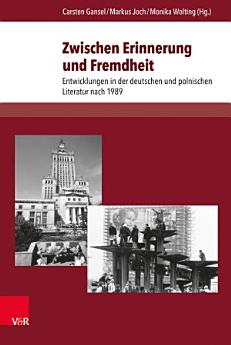Zwischen Erinnerung und Fremdheit: Entwicklungen in der deutschen und polnischen Literatur nach 1989
Carsten Gansel · Markus Joch · Monika Wolting
ມ.ສ. 2015 · V&R Unipress
ປຶ້ມອີບຸກ
460
ໜ້າ
family_home
ມີສິດ
info
reportບໍ່ໄດ້ຢັ້ງຢືນການຈັດອັນດັບ ແລະ ຄຳຕິຊົມ ສຶກສາເພີ່ມເຕີມ
ກ່ຽວກັບປຶ້ມ e-book ນີ້
Literary scholars and literary critics in Poland have been debating for over 20 years whether the year 1989 can be defined as a historic turning point in Polish literature. Among German scholars of German literature and German feature writers there is more consensus with regard to "their" literature; for most, the political turning point and the collapse of real socialism in 1989 also signified the end of so-called ideological aesthetics (Gesinnungsästhetik), in other words a departure from politico-moralistic programmes in the spirit of Group 47 or the reform-oriented socialist authors in the GDR. The co-occurrence of such decisive events in politics and literature is generally taken for granted in Germany. The critical scrutiny of "turning point rhetoric" (Thomas Anz) is clearly an exception. Polish and German observers agree only on the fact that since 1989, Poland and Germany experienced more momentous political, economic and societal changes than before. This is reason enough to scrutinise the question whether since 1989 such new literary concepts and/or significant works have emerged in both countries that besides the transformation of cultural institutions one can speak of a new beginning within the symbolic system of literature.
ກ່ຽວກັບຜູ້ຂຽນ
Prof. Dr. Carsten Gansel lehrt Neuere deutsche Literatur und Germanistische Literatur- und Mediendidaktik an der Universität Gießen. Er ist zudem Vorsitzender der Jury zur Verleihung des Uwe-Johnson-Literaturpreises sowie des Uwe-Johnson-Förderpreises und Mitglied des P.E.N.-Zentrums Deutschland. 2012 wurde er für den Diefenbaker Award (Canada) nominiert.
ໃຫ້ຄະແນນ e-book ນີ້
ບອກພວກເຮົາວ່າທ່ານຄິດແນວໃດ.
ອ່ານຂໍ້ມູນຂ່າວສານ
ສະມາດໂຟນ ແລະ ແທັບເລັດ
ຕິດຕັ້ງ ແອັບ Google Play Books ສຳລັບ Android ແລະ iPad/iPhone. ມັນຊິ້ງຂໍ້ມູນໂດຍອັດຕະໂນມັດກັບບັນຊີຂອງທ່ານ ແລະ ອະນຸຍາດໃຫ້ທ່ານອ່ານທາງອອນລາຍ ຫຼື ແບບອອບລາຍໄດ້ ບໍ່ວ່າທ່ານຈະຢູ່ໃສ.
ແລັບທັອບ ແລະ ຄອມພິວເຕີ
ທ່ານສາມາດຟັງປຶ້ມສຽງທີ່ຊື້ໃນ Google Play ໂດຍໃຊ້ໂປຣແກຣມທ່ອງເວັບຂອງຄອມພິວເຕີຂອງທ່ານໄດ້.
eReaders ແລະອຸປະກອນອື່ນໆ
ເພື່ອອ່ານໃນອຸປະກອນ e-ink ເຊັ່ນ: Kobo eReader, ທ່ານຈຳເປັນຕ້ອງດາວໂຫຼດໄຟລ໌ ແລະ ໂອນຍ້າຍມັນໄປໃສ່ອຸປະກອນຂອງທ່ານກ່ອນ. ປະຕິບັດຕາມຄຳແນະນຳລະອຽດຂອງ ສູນຊ່ວຍເຫຼືອ ເພື່ອໂອນຍ້າຍໄຟລ໌ໄໃສ່ eReader ທີ່ຮອງຮັບ.




